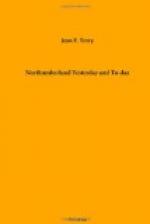At last rumours of the projected rising reached London, and a warrant was issued for the arrest of Derwentwater, even before it was known whether he had actually joined the plotters, his well-known friendship with the exiled Prince making it almost certain that he would be an important figure in any movement on their behalf. For the next few weeks the young Earl found himself obliged to remain in hiding, finding safety in the cottages of his tenants, and in the houses of friends and neighbours. Finally, though his good sense warned him that he was embarking on an almost hopeless enterprise, he decided to throw in his lot with the Jacobites.
Tradition has it that his decision was brought about by the taunts of his Countess, who, like the rest of the Jacobite ladies, was more enthusiastic than the men. Throwing down her fan, she scornfully offered that to her husband as a weapon, and demanded his sword in exchange. The immediate result was seen on that October morning when Derwentwater and his little band of followers rode over the bridge at Corbridge with drawn swords, on their way to Beaufront, which was their first rendezvous; and from there proceeded to Greenrigg, near the great Wall, which had been appointed as a general meeting-place.
There they were joined by Mr. Forster, of Bamburgh, with his contingent, and a few from the surrounding district. Rothbury next saw the little army, which was joined on Felton Bridge by seventy Scots; and thereafter Warkworth, Alnwick, and Morpeth heard James Stuart proclaimed King under the title of James III.
Newcastle was to have been their next objective, but, hearing that the city had closed its gates, and intended to hold out for King George, the Jacobite force, after some indecision, returned northward to Rothbury, where they were joined by a large company of Scottish Jacobites under Lord Kenmure. Northward again they marched to Kelso, where more than a thousand Scots joined forces with them.
The little army numbered now almost 2,000, and a council was held to determine what their next step should be. On its being resolved to enter England, some hundreds of the Highlanders returned home, leaving an army of about 1,500 to march southwards to Lancashire. On their way they put to flight at Penrith a motley force which was raised to oppose them; and, elated with a first success, moved forward to Preston, grievously disappointed on the way at the failure of the people of Lancashire to rise with them, for they had been given to understand that thousands in that county were only awaiting an opportunity to declare for “King James.”




